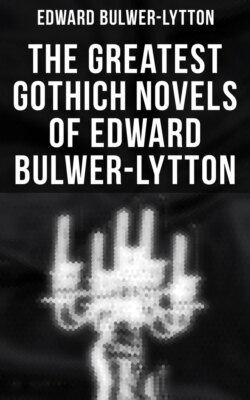Читать книгу The Greatest Gothich Novels of Edward Bulwer-Lytton - Эдвард Бульвер-Литтон - Страница 42
На сайте Литреса книга снята с продажи.
CHAPTER 3.XV.
ОглавлениеTable of Contents
Oime! come poss’ io
Altri trovar, se me trovar non posso.
“Amint.,” At. i. Sc. ii.
(Alas! how can I find another when I cannot find myself?)
The sleep of Glyndon, the night after his last interview with Zanoni, was unusually profound; and the sun streamed full upon his eyes as he opened them to the day. He rose refreshed, and with a strange sentiment of calmness that seemed more the result of resolution than exhaustion. The incidents and emotions of the past night had settled into distinct and clear impressions. He thought of them but slightly—he thought rather of the future. He was as one of the initiated in the old Egyptian mysteries who have crossed the gate only to long more ardently for the penetralia.
He dressed himself, and was relieved to find that Mervale had joined a party of his countrymen on an excursion to Ischia. He spent the heat of noon in thoughtful solitude, and gradually the image of Viola returned to his heart. It was a holy—for it was a human—image. He had resigned her; and though he repented not, he was troubled at the thought that repentance would have come too late.
He started impatiently from his seat, and strode with rapid steps to the humble abode of the actress.
The distance was considerable, and the air oppressive. Glyndon arrived at the door breathless and heated. He knocked; no answer came. He lifted the latch and entered. He ascended the stairs; no sound, no sight of life met his ear and eye. In the front chamber, on a table, lay the guitar of the actress, and some manuscript parts in the favourite operas. He paused, and, summoning courage, tapped at the door which seemed to lead into the inner apartment. The door was ajar; and, hearing no sound within, he pushed it open. It was the sleeping-chamber of the young actress, that holiest ground to a lover; and well did the place become the presiding deity: none of the tawdry finery of the profession was visible, on the one hand; none of the slovenly disorder common to the humbler classes of the South, on the other. All was pure and simple; even the ornaments were those of an innocent refinement—a few books, placed carefully on shelves, a few half-faded flowers in an earthen vase, which was modelled and painted in the Etruscan fashion. The sunlight streamed over the snowy draperies of the bed, and a few articles of clothing on the chair beside it. Viola was not there; but the nurse!—was she gone also? He made the house resound with the name of Gionetta, but there was not even an echo to reply. At last, as he reluctantly quitted the desolate abode, he perceived Gionetta coming towards him from the street.
The poor old woman uttered an exclamation of joy on seeing him; but, to their mutual disappointment, neither had any cheerful tidings or satisfactory explanation to afford the other. Gionetta had been aroused from her slumber the night before by the noise in the rooms below; but ere she could muster courage to descend, Viola was gone! She found the marks of violence on the door without; and all she had since been able to learn in the neighbourhood was, that a Lazzarone, from his nocturnal resting-place on the Chiaja, had seen by the moonlight a carriage, which he recognised as belonging to the Prince di—, pass and repass that road about the first hour of morning. Glyndon, on gathering from the confused words and broken sobs of the old nurse the heads of this account, abruptly left her, and repaired to the palace of Zanoni. There he was informed that the signor was gone to the banquet of the Prince di—, and would not return till late. Glyndon stood motionless with perplexity and dismay; he knew not what to believe, or how to act. Even Mervale was not at hand to advise him. His conscience smote him bitterly. He had had the power to save the woman he had loved, and had foregone that power; but how was it that in this Zanoni himself had failed? How was it that he was gone to the very banquet of the ravisher? Could Zanoni be aware of what had passed? If not, should he lose a moment in apprising him? Though mentally irresolute, no man was more physically brave. He would repair at once to the palace of the prince himself; and if Zanoni failed in the trust he had half-appeared to arrogate, he, the humble foreigner, would demand the captive of fraud and force, in the very halls and before the assembled guests of the Prince di—.
